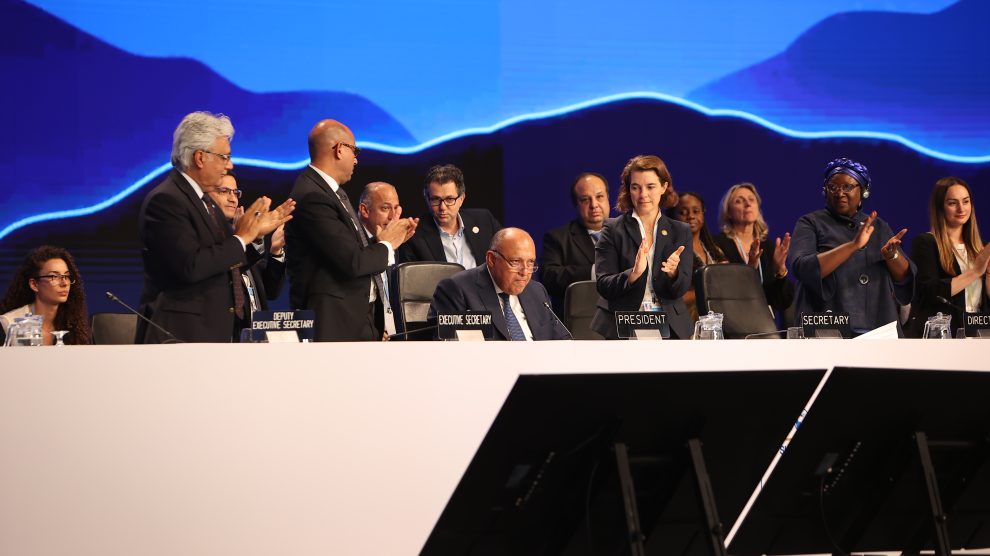There are stirrings of awareness that the ground is shifting away from fossil fuels and economies that have been based on oil and gas wealth have to reposition themselves.
From Pakistan floods to Florida hurricanes, 2022 has been yet another year of unmitigated climate-caused natural disasters.
How is the international community responding?
The scorecard is mixed at best, although a sober assessment, following the annual UN conference in Sharm El-Sheikh, should recognise setbacks and an increasingly uphill road, but also take stock of what is being achieved.
- All eyes on Ukraine at COP27
- Gulf states ramp up investment in Central Asia
- It’s time for emerging Europe to strengthen its commitment to sustainability
After the lofty targets set in Paris in 2015, and reaffirmed in Glasgow, there are three main reasons for disappointment: countries are falling short of their commitments, both in reducing emissions and, with regard to rich countries, in financing developing countries who carry the heavy load with meagre means; by some global leaders not even showing up in Egypt, key players – and polluters – such as India, China, Russia, Australia, Canada, Japan, seem to indicate that climate change is a second-tier priority; the dark shadow of great powers’ competition, epitomised by the war in Ukraine and last summer’s interruption, of the US-China bilateral dialogue over the Taiwan dispute.
Despite this unsettled backdrop COP27 has proved that the international community does still have the stamina, and common sense, to stay the course on climate change.
Kudos to the participants, though it has been a gloomy affair, especially the final day of the summit. The agreement on establishing a fund to help pay for climate-related damage suffered by especially vulnerable countries is indeed of a historic proportion. However, a broad range of nations are right to be concerned about the obvious lack of progress on cutting greenhouse gas emissions faster.
Ultimately, deeds matter, not words. Fortunately, there is a substantial group of countries that walk the walk at the climate conferences as well as beyond. These “doers” matter, geographically and strategically.
The European Union, whose negotiators played hardball and threatened to walk away from the summit, can certainly be counted in. Facing an unprecedented perfect storm it is being forced into emergency measures including temporary extension of coal-fired plants, but it’s also staying the course with its ground-breaking Fit for 55 energy transition blueprint. The EU has just reaffirmed the 2035 ban on the sale of internal combustion engine vehicles. Brexit notwithstanding, the UK is singing from the same hymn sheet. Germany is investing heavily in renewables and hydrogen. And while those coal plants will close again once Germany has overcome its immediate challenges, the hydrogen will be here to stay.
Closer to Sharm El-Sheikh, in traditional “oil-gas” territory, there are stirrings of awareness that the ground is shifting away from fossil fuels and economies that have been based on oil and gas wealth have to reposition themselves.
The host, Egypt, used the conference to turbocharge its investment in wind and blue hydrogen by signing a deal with US and Germany to fund a 500 million US dollars initiative to deploy renewable energy. Qatar has recently signed hydrogen supply agreements with European states.Saudi Arabia has set ambitious targets to move to 50 per cent renewable power by 2030. But this is just a beginning.

Towards COP28 in the UAE
Host to next year’s COP28, the UAE is the region’s major “doer”. For Energy Minister Suhail al Mazrouei oil is in long-term “decline mode”.
True to its word, the country is moving toward alternatives. The UAE recently shipped its first ever hydrogen-based ammonia test cargo to Germany, and has struck a strategic partnership (PACE) with the US to produce 100 gigawatts of clean energy by 2035, with much of it committed to emerging economies. The agreement, worth 100 billion US dollars, was recently signed by the Special Energy Coordinator, Amos Hochstein, and the UAE’s Climate Change Envoy, Dr Sultan Al Jaber.
Also in attendance were a slew of climate doers who can help spur action. Brazil’s president-elect Lula da Silva painted his new foreign-policy aspirations green. US President Joe Biden did not come empty handed: he unveiled the American involvement in the 500 million US dollars agreement to help the summit’s host nation shift to renewable energy on top of his landmark Inflation Reduction Act, which is already giving a boost to the clean energy industry by providing massive incentives for the US private sector to decarbonise in an affordable and effective way.
Is this enough to give reassurance that the world is on the right track to achieve the Paris goals? Certainly not. But this is what COP27 in Egypt, and next year’s COP28 in the UAE, are about: to get onto the major work that the international community still has to do.
The challenge ahead must not mask the fact that some real progress has been made. Tackling climate change is an endurance test. The world needs more doers and less blah, blah, blah. The 2022 doers must set the example.
Photo: © COP27 Presidency.
Unlike many news and information platforms, Emerging Europe is free to read, and always will be. There is no paywall here. We are independent, not affiliated with nor representing any political party or business organisation. We want the very best for emerging Europe, nothing more, nothing less. Your support will help us continue to spread the word about this amazing region.
You can contribute here. Thank you.


